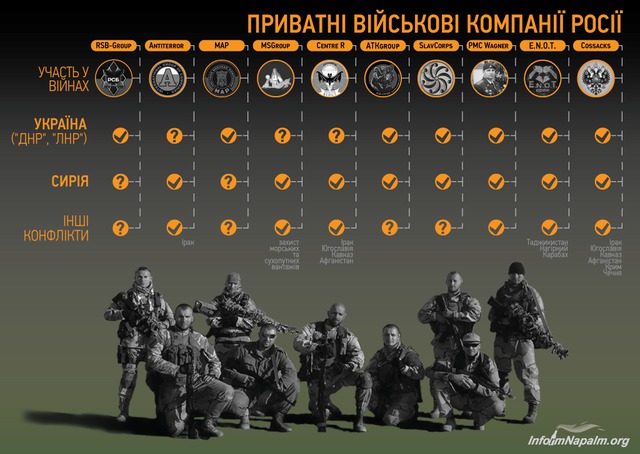Private military companies in Russia carrying out criminal orders of Kremlin, - InformNapalm. PHOTOS+VIDEO
International volunteer community InformNapalm has investigated creation and activities of private military companies in Russia, which often fulfill criminal orders of the high Russian military command.
Censor.NET reports citing InformNapalm investigation.Private military companies(PMCs) are not something new in the modern world full of local conflicts and unstable regions. PMCs are usually considered as a commercial enterprise offering specialized services for the safeguarding or protection of any objects, as well as for demining, training, maintenance, elicitation, strategic planning, logistics and consulting. Private military companies are most often used where the task is beyond the power of civilian security companies, but for whatever reasons, it is impossible or impractical to involve a regular army.
A state is the client of a PMC thus it bears responsibility for the illegal actions of private military companies if the latter acted according to its provisions, instructions or if the client state exercised effective control over it. Moreover, a receiving State is responsible for the activities of PMCs on its territory. It should monitor, within its jurisdiction, the observance of human rights by the staff of PMCs and, in the event of their violation, ensure effective investigation and punishment. Whereas, the state of the PMC`s registration place is obliged to exercise general control over the activities of PMCs, as well as over the issues related to licensing and training and, within its competence, to bring legal entities having violated the norms of international humanitarian law and human rights to legal responsibility.
From the international law point of view, PMC employees are civilians, so in a number of cases their activities could be considered as "mercenaryism". In order to avoid this, serious restrictions are imposed on PMCs. In particular, PMCs do not have the right to take part in hostilities as part of regular armed formations. But they are entitled to use weapons for self-defence and security of the objects, property and people entrusted to them. However, in real life, the line between PMCs and mercenaries is very subtle and from the point of view of international law it all depends on the tasks that are performed by these individuals.
Origins of PMCs in Russia
The history of Russian PMCs dates back to the 1990s, when the first so-called "Russian volunteers" went to fight in Yugoslavia. The FSB officer Igor Strelkov-Girkin was among them. He is known for the capture of Slavyansk in the Donbas, Ukraine, in the spring of 2014, and is accused of involvement in the downing of the Malaysian Boeing MH17 in the sky over the Donbas on July 17, 2014.
In the case of Yugoslavia, it is safe to say that the Russians could not go abroad with combat gear and participate in hostilities without the authorization of the Russian leadership. According to some sources, in 1992-1995, on the territory of Bosnia, several hundred "Russian volunteers" were constantly operating, using the tactics of reconnaissance and sabotage groups. The basis of the unit consisted of fighters of the St. Petersburg security company under the name Rubicon. Without the participation of Russian special services and the Russian government, their activities would be impossible.
Under the same scheme, the Kremlin sent mercenaries linked with the special services of the Russian Federation under the guise of "volunteers inspired by the ideas of protecting Russia's interests" to Transnistria and Nagorno-Karabakh, and later to Georgia, the Crimea, the Donbas, and Syria.
It is worth noting that against the background of such illegal military activities, Russian military experts repeatedly appeared in various absolutely legal PMCs. In particular, Russians are actively involved in protecting vessels from Somali pirates. They also worked in western PMCs during the American campaign in Iraq. But these were the foreign PMCs in which citizens of the Russian Federation participated as private individuals.
Therefore, the need to regulate the activities of PMCs in Russia appeared, which would allow not only legalize the participation of Russians in private military companies, but would also enable the Kremlin to create PMCs legally to achieve its military and political goals outside of Russia.
Attempts t o Create Regulatory Framework in Russia
One of the first attempts to resolve the issue of PMCs was the amendments to the Russian law "On Arms" (2008), which entitled the foreign security structures of Transneft, Lukoil and Gazprom to use duty weapons to ensure the security of facilities.
That was not enough and, starting in 2011, the Russian press began actively to discuss the issue of creating in Russia a military instrument of government influence. Then the press started the bombarding with information on the necessity to form "voluntary units of reservists in the FSS, the Foreign Intelligence Service of Russia, as well as in the Armed Forces of the Russian Federation". The information campaign was organized "from above" according to the classical scenario:
- bill № 574772-5 "On Amendments to Certain Legislative Acts of the Russian Federation on the Creation of a Mobilization Human Reserve" was submitted to the State Duma of the Russian Federation by the representatives of the Putin's party " Yedinaya Rossiya" (United Russia);
- the "heated" discussion about the "state of necessity" of creating a combat reserve in the law enforcement agencies was started by the leading Russian media;
- the vertical of legislative power was prepared to pass the law "backdated".
In 2013, the Russian Duma deputy A. Mitrofanov, introduced into the State Duma of Russia bill № 62015-6 "On State Regulation of the Establishment and Operation of Private Military Companies". The bill allows PMCs (quotes):
- to have military items in their use;
- to carry out entrepreneurial and other income-generating activities;
- to provide other military services.
Despite numerous attempts to regulate this tool, the official status of PMCs in Russia remains unsettled at the legislative level. These organizations remain beyond the law on the basis of:
- Art. 359 of the CC of the RF - Mercenary.
- Art. 208 of the CC of the RF - Organization of an illegal armed formation.
It is most likely that the creation of a full-fledged legal and regulatory framework in Russia has not been brought to fruition because the dual attitude of the law to the PMCs allows the Kremlin to better control these paramilitary organizations and to quickly dispatch with undesirable elements according to the "letter of the law".
Wagner Private Military Company
One of the most much-talked-of Russian PMCs is the Wagner Private Military Company (or the Wagner Group), which is the closed paramilitary structure with a training camp located in the village of Molkino, Krasnodar Krai, at the facility of the 10th Special Mission Brigade of the General Intelligence Agency (GIA) of the General Staff of the Armed Forces of the Russian Federation. There is a high probability that a mechanism for the establishment of voluntary reservists of the Russian GIA is implemented here. The WSJedition claims Putin's minion, businessman Eugeniy Prigozhin to be the creator and mastermind of PMCs Wagner.
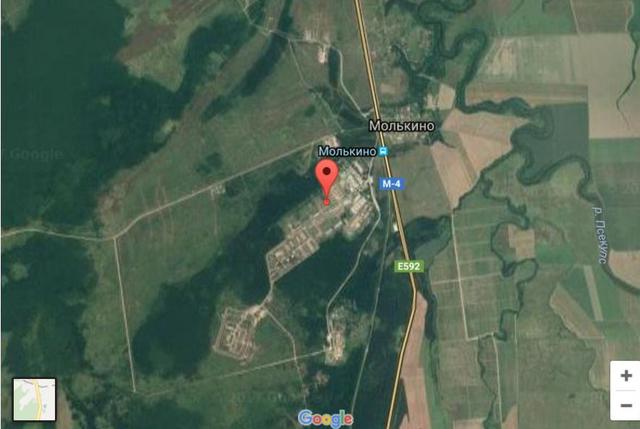
Location m/u 51532 RF AF GS GIA 10th separate special mission brigade. Address: Russia, Krasnodar region, town of Goryachy Klyuch, vil. Molkino (44°47'42″N 39°13'19″E)
PMCs Wagner is headed by Lieutenant-colonel of the Pskov Special Forces of the GIA of the Defence Ministry of Russia Dmitry Utkin. In 2002, he gets on the Uniform State Register of Legal Entities as the commander of military unit 75143 in Pskov. On transferring from active duty to the reserves in 2013, Utkin went to Syria along with other security veterans to fight on the side of President Bashar al-Assad as part of the Slavic Corps, a Russian mercenary group. There, in October 2013, they almost were encircled by the rebels and were forced to return to Moscow. The Slavic Corps leadership were then condemned to three years in a general regime colony under the article on mercenaryism.
Almost immediately after returning to Russia, Utkin went to Ukraine at the head of his own group of mercenaries. This unit was named the Wagner Group after Richard Wagner, a favourite composer of Adolf Hitler, for whom Utkin allegedly holds affection. The Slavic Corps veterans were seen both in the Crimea in February 2014 and then at Donbas, where they fought alongside Russian militants. According to the Russian media, the Wagner squad could have been involved in the killing of several warlords of so called "LPR".
In Wagner PMCs, everything is organized as in an elite force - arrival, interview, study, quarantine, intensive specific training, exam and submission on assignment. At the same time, the first priority is the principle of keeping information secure. Numerous press materials indicate that, at the moment, the main task of Wagner PMCs is to train and supply fighters for war in Syria. Apparently, they form the backbone of the troops that are fighting under the disguise of the volunteers on the Assad side. The "vacationists" are sent to Syria from the Primorsko-Akhtarsk military airfield, 200 km from the training centre.
Wagner PMCs In the Crimea and Donbas
According to various journalistic investigations, Wagner PMCs was directly involved during the occupation and annexation of the Crimea by the Russian Federation in 2014. Ruslan Leviev, an activist in the Conflict Intelligence Team investigative group, seeking and verifying information from open sources in the Internet, describes those events in the Crimea:
"If you look at the documentary footage of the Crimean history, you'll see many different people there". You will see those who have been called soldiers of the Russian army, and indeed they appear to be contract soldiers of elite parts of the Russian Armed Forces. You'll see a lot more adults in an unintelligible uniform, resembling a very serious special forces team a lot, and you're going to see some very confusing people in ace deuce camouflage and in civilian clothes. A wide variety of people from different organizations, including, as far as I know, the people from the Wagner Group, appears to have been there. Those people on all the posters, "polite people", with cats and dogs, of course, are not them".
After the annexation of Crimea and the beginning of Russia's military intervention on Donbas, Wagner PMCs was seen in the east of Ukraine. In October 2015, Fountanka wrote about the Wagner Group: with reference to anonymous sources, the edition stated that former mercenaries from the Slavic Corps had been seen on Donbas as a separate unit. At the end of 2015, the Wall Street Journal also wrote on the participation of the Wagner Group in the fighting on the side of the terrorist organizations "DPR" and "LPR".
Wagner PMCs Real Status and Relationship with Kremlin
Taking part in the annexation of Crimea and in the fighting on Donbas, Wagner PMCs cannot be termed a "private military company" from the point of view of international law, even more so from the point of view of Russian law. It does not protect sites or escort objects but performs military tasks on an equal level with the national armed forces. The armed group is acting on the order of the Kremlin and is supervised by the Russian special services, performing those military tasks in which the Russian authorities does not want to "blow" its regular troops. In other words, Wagner PMCs is a private and illegal special forces, secretly carrying out the criminal orders of the Kremlin.
An officer of the Russian Defence Ministry and a FSB official in an interview with the RBC said that it was the Russian GIA that had been tacitly administering the Wagner PMCs and added that the squad had emerged after "the situation in the world had turned tense". Given the period of Wagner PMCs origin, what is meant here is perhaps the annexation of Crimea and the beginning of the war in Donbas.
In the spring of 2016, the media reported that Wagner PMCs, apparently unrelated to any formal power structure of the Russian Federation, had received combat danglers for the combat work. The journalists demonstrated the prize papers signed by President Vladimir Putin.
On 9 December 2016, at the reception in the Kremlin dedicated to "Day of Heroes of the Fatherland", journalists spotted the leader of Wagner PMCs, Dmitry Utkin.

Dmitry Utkin at a reception in the Kremlin
The shot of Utkin and his deputy Andrei Troshev taking photo together with president of the Russian Federation Vladimir Putin also leaked into the network.
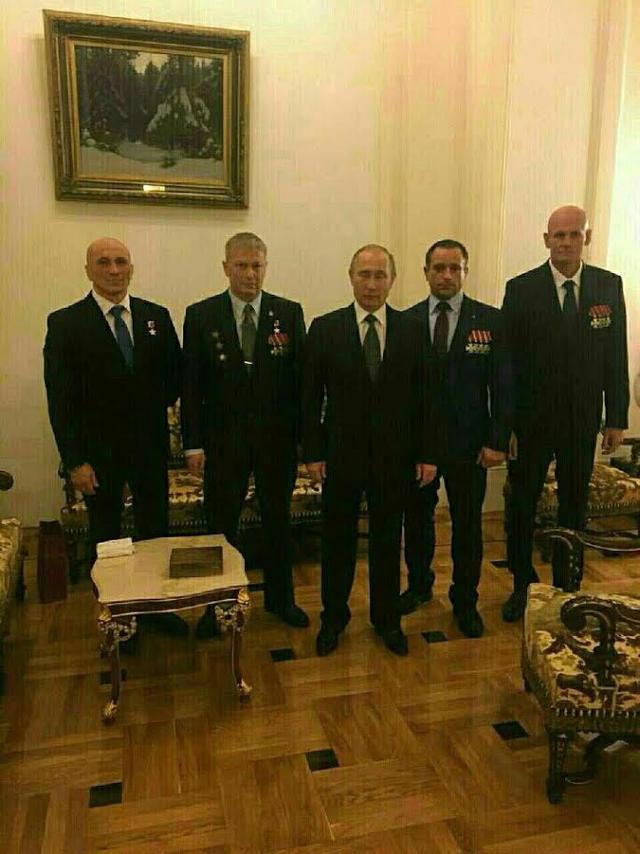
Dmitry Utkin is on the far right, Andrei Troshev - second from left
Utkin`s appearance in the Kremlin is his first entry into the public field after a series of journalistic investigations of the activities of private military companies in Russia. According to the Russian president press secretary, Dmitry Peskov, Utkin was among those invited from the Novgorod region, as he was the recipient of the Order of Courage.
Utkin's deputy Andrei Troshev is a retired colonel and a military officer who went through wars in Afghanistan and Chechnya with two orders of the Red Star and two Orders of Courage on his breast. The Golden Star of the Hero of Russia is also on his breast. According to the Fountanka, Troshev was granted with the rank of Hero for his involvement in the Syrian Palmyra charge in the spring of 2016. By that time, officer Troshev had been retired for several years.
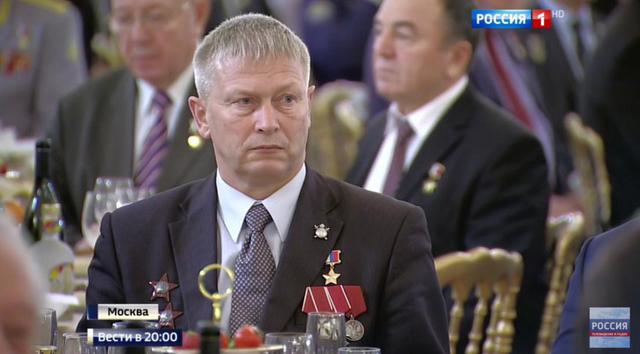
Andrei Troshev at a reception in the Kremlin
On 6 June 2017, the media reported the poisoning of Troshev by vodka in Petersburg. During his hospitalization, he was found to have five million rubles and five thousand dollars in cash, Syria's geographical maps, a weapons calculation sheet and an electronic airline ticket to Krasnodar. No explanation was made by the patient.
Wagner Returns to Syria
In 2015, after undergoing some training at a specially equipped base in Krasnodar Krai, Wagner and his squadron returned to Syria. Soon after Russia's air campaign was launched, there appeared first reports of the death of Russian mercenaries on the ground. The most widely spoken of was the story with photos of Russians which purportedly died in the battle for Palmira in March 2016. According to unofficial sources, they were from Utkin's private military company. He could have suffered up to 600 fatalities in Syria, as reported by Sky News.
According to confidential sources, there are already a few hundred dead militants in the ranks of Wagner PMC. This information is partially verified by open sources:
- 24, 2015: 10 coffins arrived to Sevastopol from Syria;
- 20, 2015: a vessel arrived in Sevastopol with bodies of 26 sea soldiers of the 810th Separate Marine Brigade;
- 27, 2015: a coffin of a soldier who died in Syria was furnished to Sevastopol.
In late June 2017, a video appeared on the Internet allegedly showing militants from Wagner PMC torturing captives or hostages in a Syrian desert. In the video, Russian-speaking armed men beat a man with a sledge hammer calling him an idilovets (a Russian term for members of ISIS). Another man was decapitated, buried or concreted up to his neck.
Restaurateur Yevgeny Prigozhin, Wagner and Syrian Oil
Another eloquent proof of the Kremlin's direct connection with Wagner PMC is Yevgeny Prigozhin, who is in fact a monopolist in the Russian market of the government military order in the fields of military meal service, cleaning, building and energy industries. Being Russian president's close ally, the businessman, often called "Putin's chef" and alleged to be the owner of the "troll factory", is the creator and inspirer of Wagner PMC, WSJ reported.
According to Fontanka, in 2015-2016 Utkin and his deputy Troshev were seen travelling together with Prigozhin's security officers and were likely to work for units of Prigozhin-controlled group Concord.
Recently, the media reported that contracts for the production of a quarter of all gas and oil located on the Syrian territory recovered with Russia's help for Bashar al-Assad might be awarded to Prigozhin-associated LLC Yevro Polis. In exchange, LLC Yevro Polis would commit itself to recovering oil deposits and infrastructure facilities from ISIS militants and opponents of Assad's regime, and to protecting them thereafter. Interestingly, Wagner PMC is among the candidates for providing protection to those deposits.
As Fontanka reports, the respective memorandum of intent was signed in December 2016, during the meeting of Syrian Minister of Petroleum and Mineral Resources Ali Ganev and Russian Energy Ministry Alexandr Novak. The memorandum was signed for a period of five years.
The media, referring to a source in the PMC, report that Prigozhin has been investing money into Wagner PMC with a view to getting some dividends apart from profit of carrying out military acts. The source also said that it was Syrian oil which the "main emphasis" was made on.
"Now, Prigozhin receives big government orders [for carrying out military tasks on the frontline and protecting critical infrastructure]. However, there [in Syria] the Syrian government has already signed a five-year contract with one of Prigozhin's oil companies. A friend of mine works there," the source said. It also noted that the mentioned oil deposits lay in the central part of Syria.
Another source, close to Wagner, told the media that Prigozhin had been given all oil derricks in Syria. "Now they are looking for people to protect them," the source said.
Sanctions against Wagner PMC and Prigozhin's Companies
On 20 June 2017, the USA imposed personal sanctions on Dmitry Utkin. According to US Treasury's official website, "Dmitry Utkin is the founder and leader of Wagner PMC. Sanctions against Utkin are introduced due to his participation, either directly or indirectly, in activities or policies threatening Ukraine's peace, stability, sovereignty or territorial integrity; and to his actions, either direct or indirect, on behalf of Wagner PMC".
The US has also imposed sanctions on Wagner PMC as legal entity. "Wagner PMC is a private military company which recruits and sends soldiers for participation in the war in the east of Ukraine on the part of separatists. Sanctions against Wagner PMC are introduced due to his participation, either directly or indirectly, in activities or policies threatening Ukraine's peace, stability, sovereignty or territorial integrity," the US Treasury Department said in its statement.
Moreover, companies of Yevgeny Prigozhin, who is accused of ties with Wagner PMC, were also subject to extended sanctions. Prigozhin himself had earlier been included into the personal sanctions list.
"First-Hand" Info on Russian PMCs
Some information as to the activities of Russian PMCs, including their participation in the war in Donbas, can be found on their members' social media accounts.
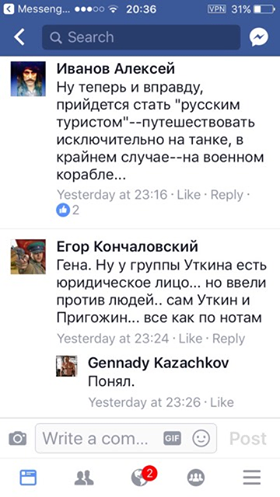
"Yegor Konchalovskiy", a codename of Oleg Krinitsynm, head of PMC RSB-Group

FSB's (Federal Security Service) officer ID of Krinitsyn, head of PMC RSB-Group
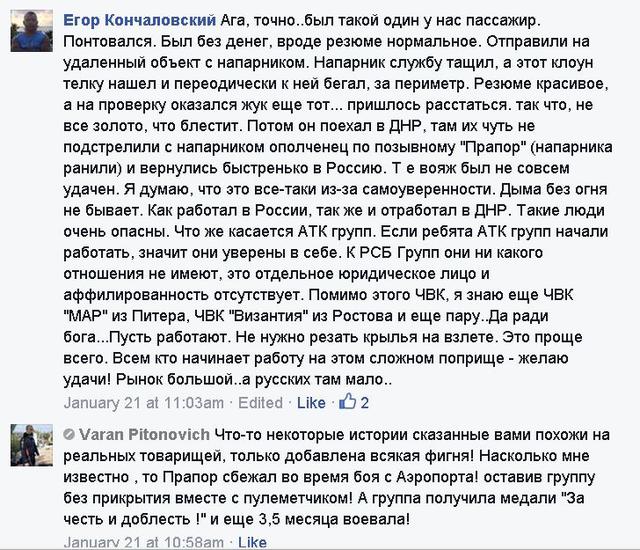
Oleg Krinitsyn on trips of his PMC's militants to Donbas
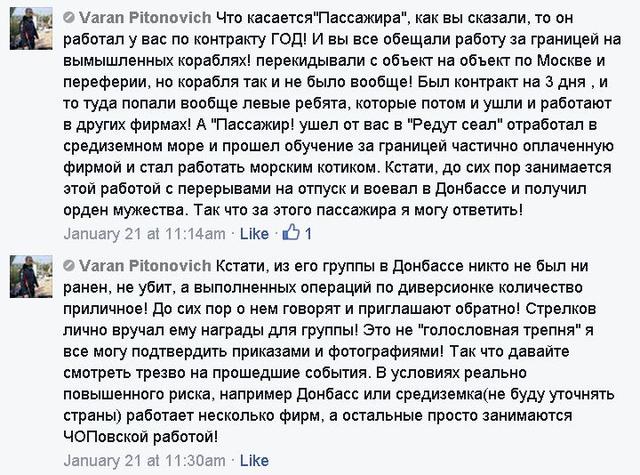
Varan, who has some experience in working in the PMC and fought in Donbas, writes on trips of the PMC's militants to Donbas
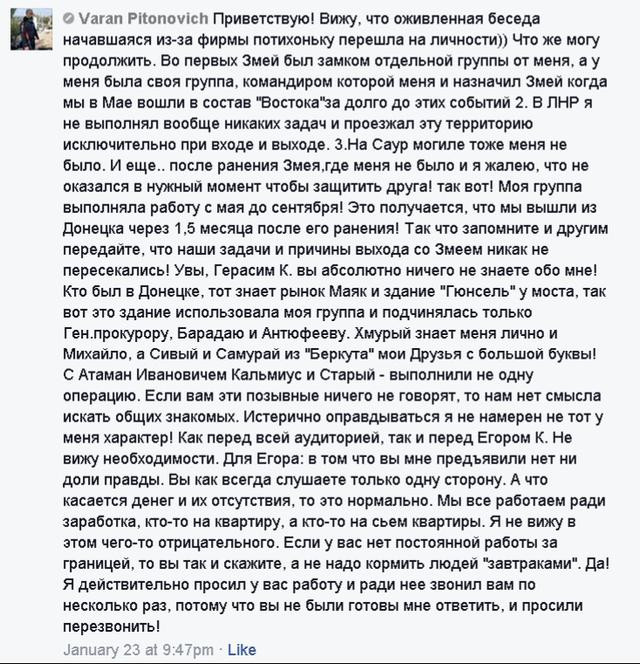
Varan admits their goal is money
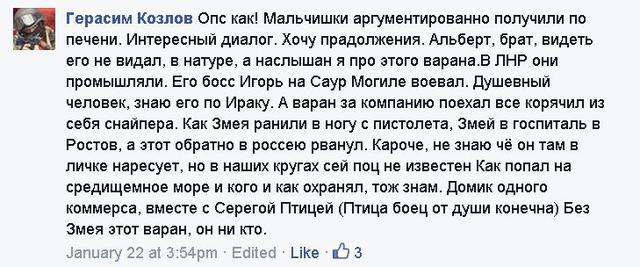
Another PMC's member comments on Varan's "feats"

PMC's member discusses risks of a trip to Donbas
PMC "E.N.O.T. Corp"
Another "shadow" unit is Moscow-based PMC E.N.O.T. Corp. Unlike Wagner PMC, this company has a website where it posted some information about itself.
E.N.O.T. Corp is allegedly concerned with military-patriotic activities as well as collecting assistance for "Novorossiya". However, some other data suggests its implication in military operations in the ATO area, such as the "clean-up of militants in Antratsyt", "military engagement on the part of terrorists" and "accompanying 'humanitarian' convoys". Among those involved in the PMC's activity is Alexandr Boroday, directly associated with Russia's FSB.
The company possesses arsenals of weapons as well as training facilities for gunnery, field engineering, intelligence and military planning. It is highly likely that the military-patriotic and humanitarian component of E.N.O.T.'s activity is just a backdrop for its main tasks, namely special operations for providing weapons and equipment to Luhansk militants and participating in military operation.
Within PMC E.N.O.T. Corp itself, it is openly spoken that its members are taking part in military engagement in Donbas. The PMC even co-founded so-called "Union of Donbas Volunteers", led by Alexandr Boroday. "E.N.O.T. Corp has recently announced its withdrawal from the "Union". The company has letters of gratitude both from the occupational "authorities" in Donbas and the Russian government bodies.
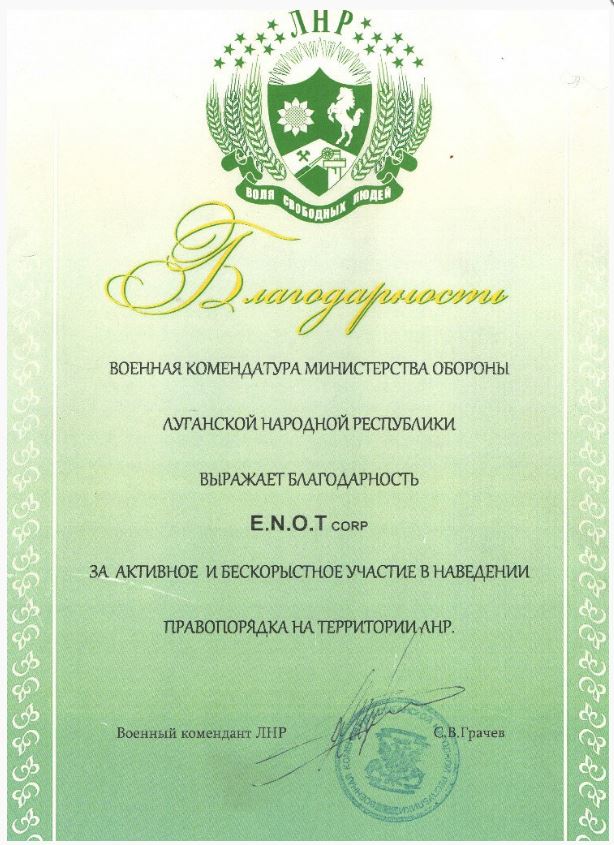
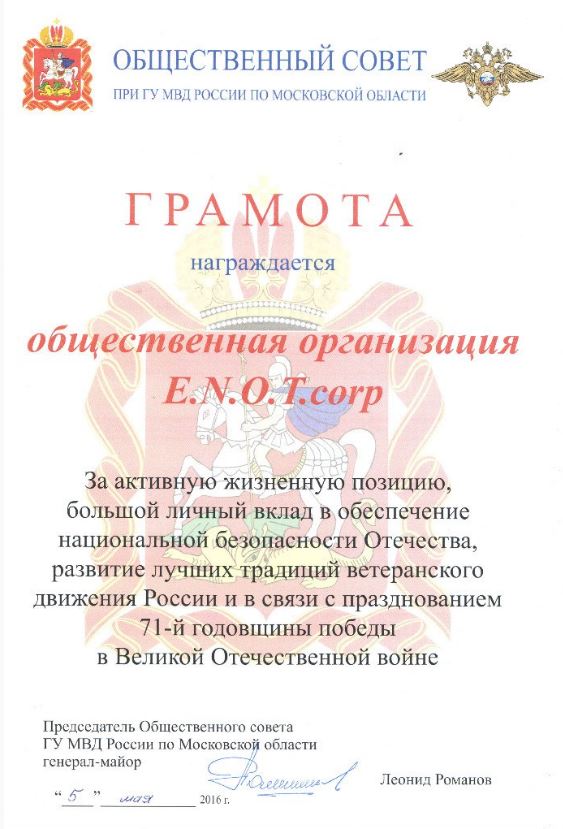
Obviously, had the Kremlin and the FSB not authorized it, E.N.O.T. Corp could not have taken part in the war in Donbass and "ensure the rule of law" in Russia-occupied territories of Donbas.
According to confidential sources, overseers of PMC E.N.O.T. Corp are now recruiting terrorists from Donbas to Syria. From 700 to 1,000 militants have reportedly left the occupied areas of Ukraine. Donetsk militants are motivated by being granted Russian citizenship, expungement and substantial wages (from 90,000 to 250,000 rubles). However, the militants are advised they go "protect Russia" not only in Syria but also in Tajikistan and the Nagorny Karabakh, the areas with a complex situation and a risk of unpredictable escalation.
PMC MAR from St. Petersburg in Donbas
In 2015, media reported on yet another Russian PMC which took part in military operation in Donbas. At the time, photos of members of PMC "MAR" with the company's flags near the entrance to Donetsk and the small town of Spartak, where the line of demarcation lay, appeared on the social media.
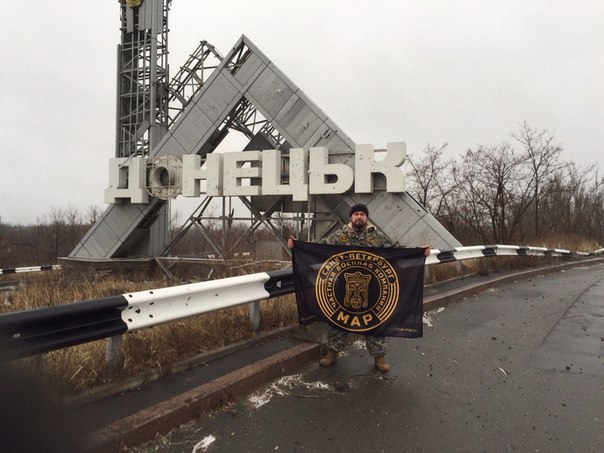
Member of PMC MAR near the entrance to Donetsk
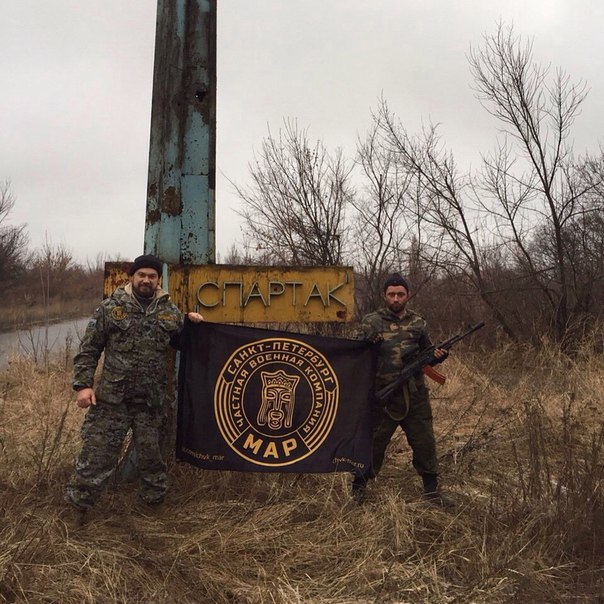
Members of PMC MAR near Spartak
It is indicated on MAR 's own website that the company specializes in private military activity. Besides, as mentioned on the website, its aim is generating profit by providing private military services.
In the article "Protecting Russian-Speaking Population in Neighbouring Countries " on the MAR 's website, it is clearly indicated that it is taking part in military engagement in Donbas on the part of Russian militants.
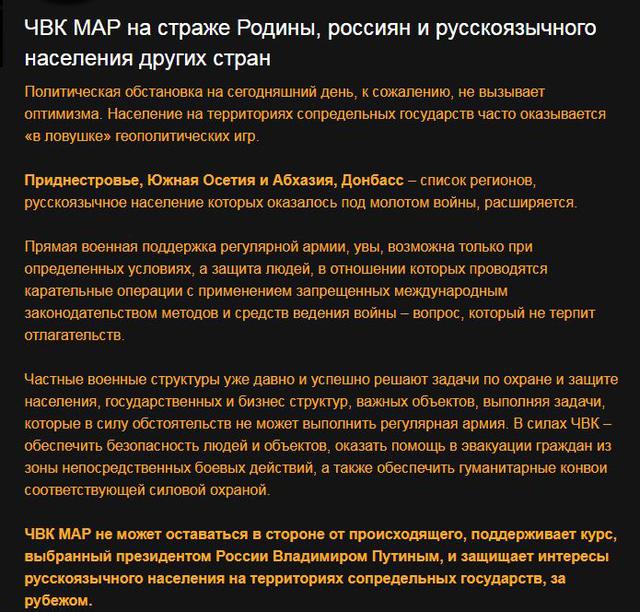
Screenshot of PMC MAR's website
Also, it contains the motivation. "PMC MAR cannot keep out of what is going on, supports the policy undertaken by Russian President Vladimir Putin and protects the interests of Russian-speaking population in neighbouring countries and abroad," the PMC's website reads.
The reports on PMC's activities in Donbas indicate that its members deliver humanitarian assistance in Donbas and take part in military operation there. In particular, one of the articles published on the company's website as far back as in June 2015, features photos of its members with weapons in trenches on the frontline.

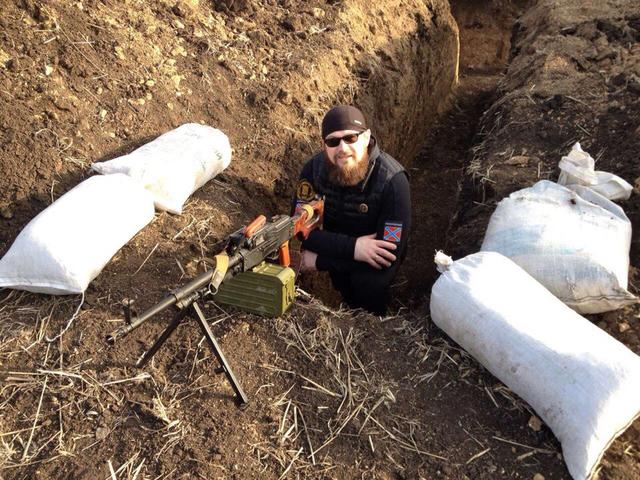
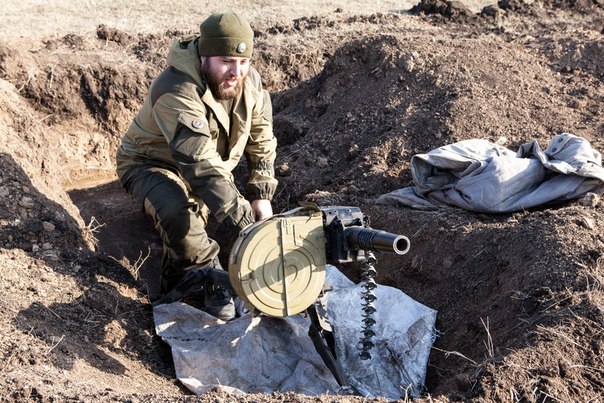
Other Russian PMCs
Russian mercenaries' illegal activity in Crimea, Donbas and Syria is not limited to the above PMCs. According to InformNapalm, an international volunteer community, other Russian PMCs are also carrying out their activities some way or other beyond Russia.
